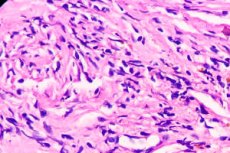Nye publikasjoner
Forskere har fjernet hjernekreftcellenes evne til å overleve med en ny metode
Sist anmeldt: 02.07.2025

Alt iLive-innhold blir gjennomgått med medisin eller faktisk kontrollert for å sikre så mye faktuell nøyaktighet som mulig.
Vi har strenge retningslinjer for innkjøp og kun kobling til anerkjente medieområder, akademiske forskningsinstitusjoner og, når det er mulig, medisinsk peer-evaluerte studier. Merk at tallene i parenteser ([1], [2], etc.) er klikkbare koblinger til disse studiene.
Hvis du føler at noe av innholdet vårt er unøyaktig, utdatert eller ellers tvilsomt, velg det og trykk Ctrl + Enter.

Når du slår av bremsene på en racerbil, krasjer den raskt. Dr. Barak Rotblat ønsker å gjøre noe lignende med hjernekreftceller: slå av evnen deres til å overleve når glukosen er oppbrukt. Han tar sikte på å få fart på kreftcellene slik at de dør like raskt. Denne nye tilnærmingen til behandling av hjernekreft er basert på et tiår med forskning i laboratoriet hans.
Nye oppdagelser
Dr. Rotblat, studentene hans og medforsker Gabriel Leprivier ved Institutt for nevropatologi ved Universitetssykehuset Düsseldorf publiserte funnene sine forrige uke i tidsskriftet Nature Communications.
Frem til nå trodde man at kreftceller primært var rettet mot vekst og rask reproduksjon. Det har imidlertid blitt vist at svulster har mindre glukose enn normalt vev.
Hvis kreftceller er fullstendig fokusert på rask reproduksjon, burde de være mer avhengige av glukose enn normale celler. Men hva om deres absolutte prioritet er overlevelse, ikke eksponentiell vekst? Da kan det å utløse vekst når det er mangel på glukose føre til at cellen går tom for energi og dør.
Utsikter for personlig tilpasset medisin
«Dette er en spennende oppdagelse vi har gjort etter et tiår med forskning», forklarer Dr. Rotblat. «Vi kan utelukkende målrette kreftceller uten å påvirke normale celler, noe som vil være et viktig skritt mot personlig medisin og terapier som omgår friske celler på samme måte som cellegift og stråling gjør.»
«Oppdagelsen vår av glukosemangel og rollen til antioksidanter åpner et terapeutisk vindu for utviklingen av et molekyl som kan behandle gliom (hjernekreft),» legger han til. Et slikt terapeutisk middel kan også brukes på andre typer kreft.
Forskning og resultater
Rotblat og studentene hans, Dr. Tal Levy og Dr. Haula Alasad, begynte med å vurdere at celler regulerer veksten sin basert på tilgjengelig energi. Når det er rikelig med energi, akkumulerer cellene fett og syntetiserer mye proteiner for å lagre energi og vokse. Når energien er begrenset, må de stoppe denne prosessen for å unngå å gå tom for energi.
Svulster er generelt i en tilstand av glukosemangel. Forskere har begynt å lete etter molekylære bremser som lar kreftceller overleve i et glukoseunderskudd. Hvis de kan slås av, vil svulsten dø, og normale celler som ikke er glukosemangel vil forbli uskadd.
MTOR-signalveien og rollen til 4EBP1
Rotblat og teamet hans studerte mTOR-signalveien (mammalian target of rapamycin), som er utstyrt med proteiner som måler en celles energitilstand og regulerer dens vekst. De fant ut at et protein i mTOR-signalveien kjent som 4EBP1, som hemmer proteinsyntesen når energinivået synker, er essensielt for overlevelsen til menneske-, mus- og til og med gjærceller når de mangler glukose.
De viste at 4EBP1 gjør dette ved å negativt regulere nivåene av et nøkkelenzym i fettsyresynteseveien, ACC1. Denne mekanismen brukes av kreftceller, spesielt hjernekreftceller, for å overleve i tumorvev og skape aggressive svulster.
Utvikling av en ny behandling
Dr. Rotblat samarbeider nå med BGN Technologies og National Institute of Biotechnology i Negev for å utvikle et molekyl som vil blokkere 4EBP1, noe som fører til at glukosefattige tumorceller fortsetter å syntetisere fett og tømmer ressursene sine når glukosen er oppbrukt.
